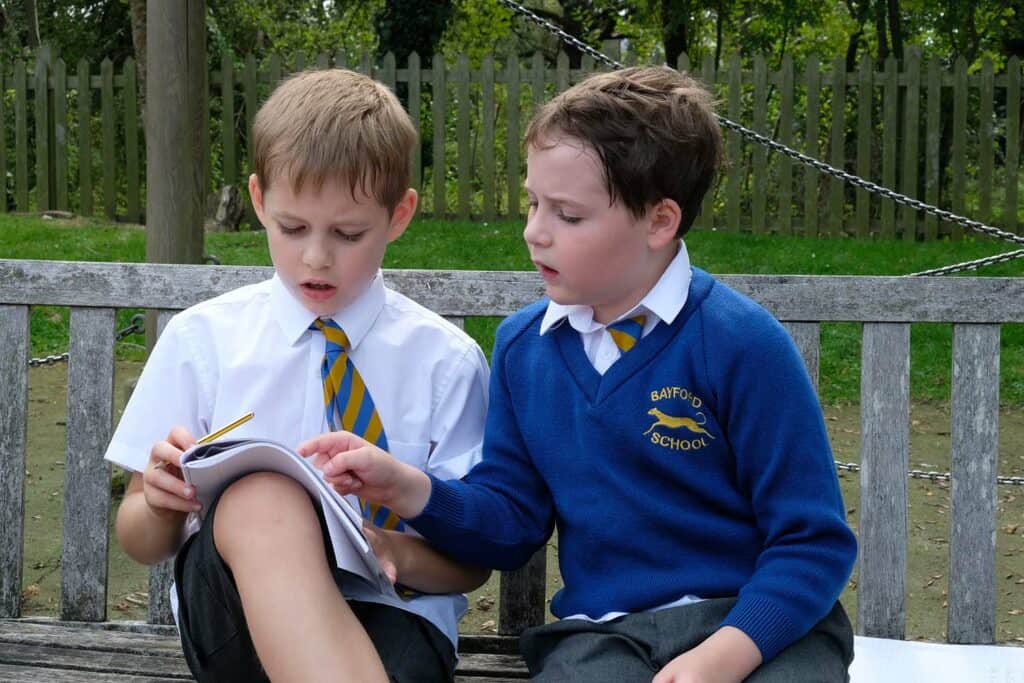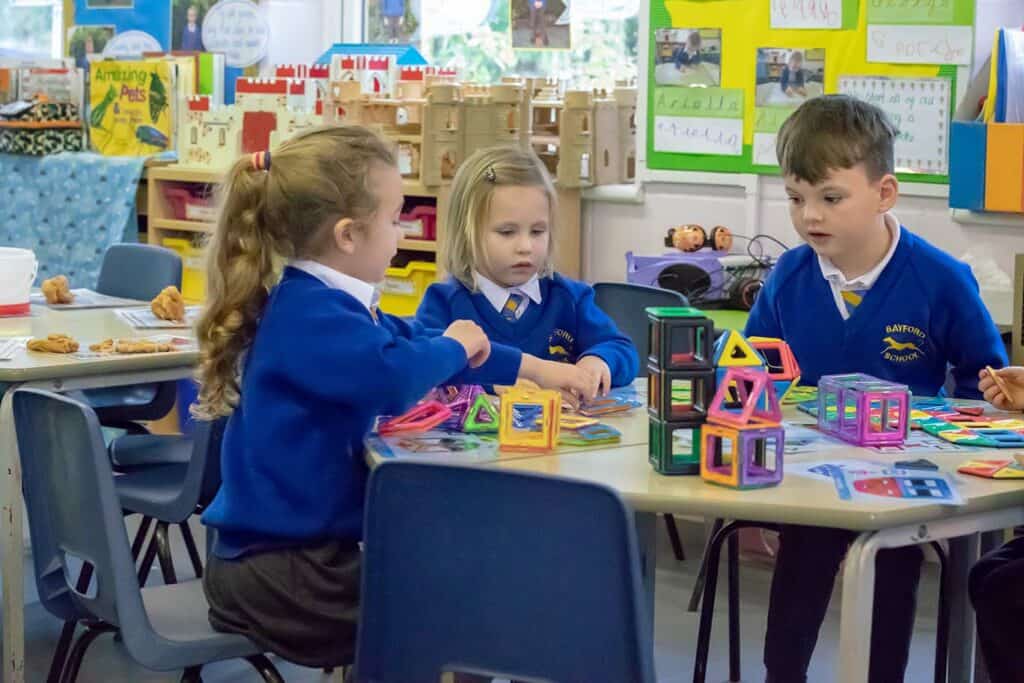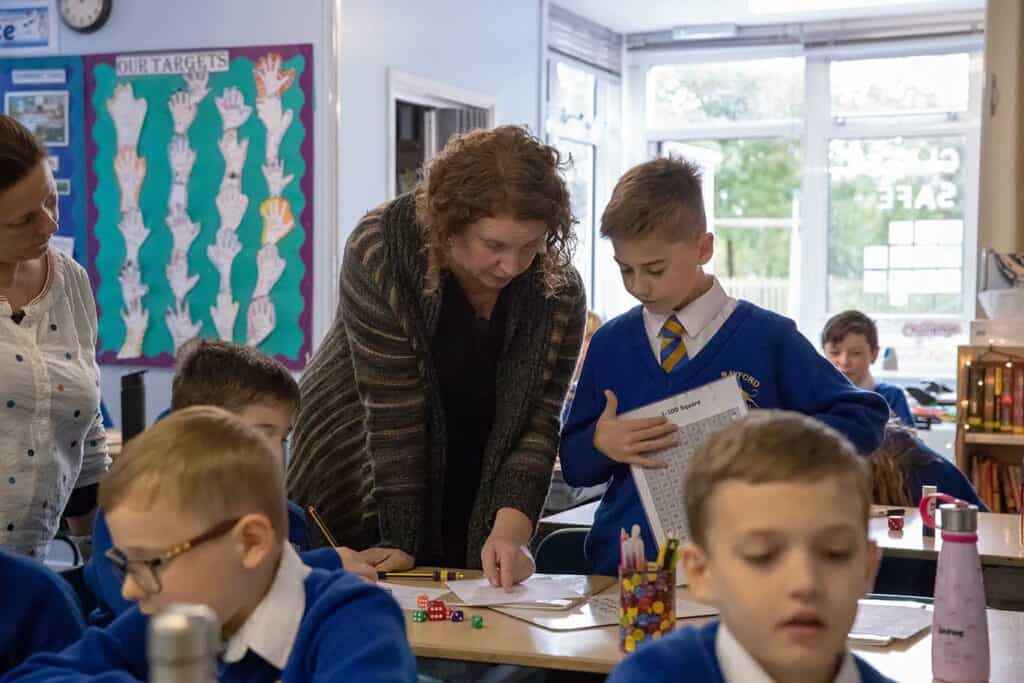All about learning
This page explains how we help the children in our school to become effective life-long learners. You can read more about it in our Teaching and Learning Policy, which you can access using the button.
You can also find information on other learning pages about curriculum areas which we regard as particular strengths of our school, like learning outside the classroom, music, religious education, and sport.
There are also pages for each class, giving an insight into what your child will be learning each half term; and for those who want to know about learning at Bayford in much more detail, a page giving access to all our planning and tracking documents based on the National Curriculum for England.
At Bayford it all begins with our vision and values. We model our values of courage, appreciation, respect, peace, responsibility, and love. We treat children fairly and give them equal opportunity to take part in class activities. All our teachers follow the school behaviour policy. Teachers set and agree with children a class code of conduct at the beginning of each school year. We expect all children to comply with these rules that we jointly devise with them, to promote the best learning opportunities for all. Children are also expected to follow the whole-school code (Ready, Respectful, Safe). We praise children for their efforts and, by so doing, we help to build positive attitudes towards school and learning in general. We insist on good order and behaviour at all times.

Our vision for learning
Our vision is that every member of our school community reaches their full potential as individuals in a school where we are living God’s love, through our Christian values and by serving others, respecting, and celebrating differences, and becoming life-long learners displaying confidence, independence, and flexible thinking.
We believe that learning should be a rewarding and enjoyable experience for everyone. Through our teaching, we equip children with the skills, knowledge and understanding necessary to be able to make informed choices about the important things in their lives. We believe that appropriate teaching and learning experiences help children to lead happy and rewarding lives today and prepare them for the future.
Our vision has lead us to emphasise learning outside the classroom because we believe that this innovative and enriching approach to learning is the best way to make the vision a reality. We are delighted that the hard work put into making learning outside the classroom central to our school has been recognised nationally by the award of the LOtC Mark (Silver). The Gold Mark is our next target and we’re already on the way to achieving it!
Aims and objectives
We provide a rich and varied learning environment that allows children to develop their skills and abilities to their full potential. Through our teaching we aim to:
- enable children to become confident, resourceful, enquiring and independent learners;
- foster children’s self-esteem and help them build positive relationships with other people;
- develop children’s self-respect and encourage children to respect the ideas, attitudes, values and feelings of others;
- show respect for all cultures and, in so doing, to promote positive attitudes towards other people;
- enable children to understand their community and help them feel valued as part of this community;
- help children grow into reliable, independent and positive citizens with respect for British values.


Effective learning
We aim for our children to show a growth mindset in their learning. We celebrate mistakes, as we believe that making mistakes and learning from them, results in the best learning. We encourage children to choose their own level of challenge in lessons so that they are working at a pace where they will make the most progress.
Children are given opportunities to work with ‘talk partners’ which gives them the opportunity to share and develop their thinking with a peer.
We offer opportunities for children to learn in different ways. These include:
- investigation and problem solving;
- research and finding out;
- group work;
- paired work;
- independent work;
- whole-class work;
- asking deep questions and encouraging careful listening and responding;
- use of ICT;
- fieldwork and visits to places of educational interest;
- visitors and specialists;
- creative activities;
- using education film clips/ images and responding to musical or recorded material;
- debates, role-plays and oral presentations;
- designing and making things;
- outdoor learning;
- participation in athletic or physical activity.
We encourage children to take responsibility for their own learning, to be involved as far as possible in reviewing the way they learn, and to reflect on how they learn. Since learning is life’s most important skill, we want them to take responsibility for their learning and to become resilient, resourceful and reflective learners.
Effective teaching
When teaching, we focus on motivating the children and building on their skills, knowledge and understanding within the curriculum. We follow the national curriculum through a rolling two-year plan to guide our teaching and learning. This sets out what is to be taught to each year group.
We base our teaching on our knowledge of the children’s level of attainment. Our prime focus is to develop further the knowledge and skills of the children. We ensure that we do not put a ceiling on children’s learning, by encouraging a growth mindset and giving children opportunities to choose the level of difficulty in their work for themselves. We have high expectations of all children, and we believe that their work here at Bayford Primary School is of the highest possible standard. Children with Special Educational Needs and Disabilities (SEND) are supported by the Assess, Plan, Do, Review process. Teachers are supported to meet the needs of all pupils by the Inclusion Co-ordinator. (See Inclusion Policy).
We carefully assess children and identify next steps which we share with the children. Next steps are also shared with parents through parent consultations and end of year reports.
We plan our lessons with clear learning objectives, based on the National Curriculum. Teachers are reflective about learning and use responsive teaching – we fine tune teaching during lessons and plans for future lessons according to the engagement and understanding of the children.
Our staff may use AI generation tools (e.g. to help create teaching resources or to assist with administrative tasks), however any information produced would be vetted before use.

Parents have a part to play!
We believe that parents have a fundamental role to play in helping children to learn. We inform parents about what and how their children are learning by:
- holding parents’ evenings to explain our school strategies for teaching English, maths and health education;
- displaying an outline of the topics that the children will be studying in class curriculum booklets on our website;
- regularly reporting to parents, explaining the progress made by their child and indicating how the child can improve further;
- explaining to parents how they can support their children with homework. We suggest, for example, regular shared reading with very young children, and support for older children with their projects and investigative work (for more information see our Home Learning Policy, which you can access from this page);
- keeping the website up to date and informative.
We believe that parents have the responsibility to support their children and the school in implementing school policies. We would like parents to:
- ensure that their child has the best attendance record possible;
- ensure that their child is equipped for school with the correct uniform and PE kit;
- do their best to keep their child healthy and fit to attend school;
- inform school if there are matters outside of school that are likely to affect a child’s performance or behaviour at school;
- promote a positive attitude towards school and learning in general;
- fulfil the requirements set out in the home/school agreement.
This page was last updated on 18th October 2025
